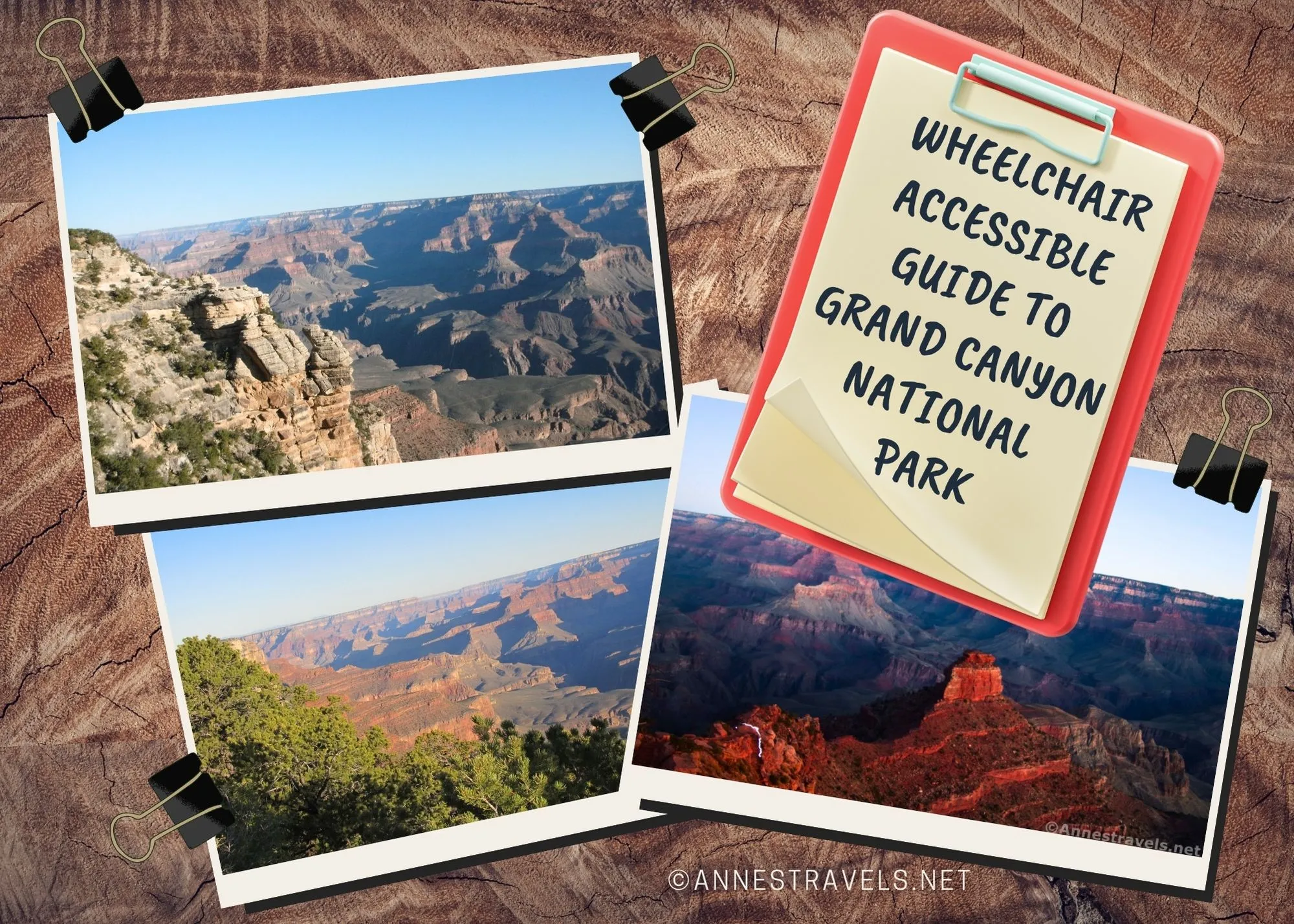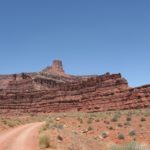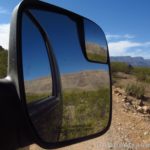
Grand Canyon is my most-visited National Park – with good reason! The views are spectacular and generally easy to access. The good news is that most of these views are also wheelchair accessible or accessible to the mobility impaired. In this post, I’d like to cover some of the views and trails you can see from either a wheelchair or from the comfort of your vehicle.
Before we begin, realize that there are three general parts of Grand Canyon National Park – the South Rim (most developed), the North Rim, and Toroweep Overlook (not wheelchair accessible, so I won’t detail it in this post). The three are separated from each other by long drives, and each has its own special perspective on the Grand Canyon. The South Rim is open all year (be wary of ice and snow in the winter), while the North Rim is only open May 15-mid-October. I personally like visiting in April or October, though the shoulder months of May, late September, and early November can be nice, as well.
Without further ado, let’s jump into it!

South Rim Shuttle Buses are Wheelchair and Mobility-Impaired Accessible
This is a great way to see the south rim of the park. Wheelchairs larger than 30” x 48” cannot be accommodated – which means that most motorized scooters will also not fit. Instead, the park offers those with mobility issues an “accessibility permit” that allows private vehicle access to areas that are generally only accessible via the shuttle buses (specifically, Hermit’s Rest Road and the road to Yaki Point). The accessibility permit can be obtained at the entrance gates and the visitor center.
Another great way to explore the South Rim is to rent a wheelchair or a tandem bicycle at Bright Angel Bicycles, located next to the visitor center.

North Rim Wheelchair Loans
The North Rim Visitor Center offers a limited number of free wheelchairs for loan.
Wheelchair and Mobility Impaired Trails and Viewpoints on Grand Canyon’s South Rim

Rim Trail
The Rim Trail between the Bright Angel Lodge and the South Kaibab Trailhead is wheelchair-accessible, offering approximately 5 viewpoints in nearly 5 miles. The portion of the trail between Monument Creek Vista and Hermit’s Rest (about 2.8 miles) is also accessible – the rest of the trail has too many steep grades to be considered accessible without assistance and may not be paved.

Hermit’s Rest Road
Trailview Overlook, Hopi Point, two viewpoints on either side of Mohave Point, The Abyss, and a viewpoint just before Pima Point all offer “windshield views” – in other words, you can see the canyon without getting out of your vehicle. Most of these (along with Maricopa Point, Powell Point (one of my favorites), and Monument Creek Vista) also offer wheelchair-accessible sidewalks to see the view.
Views in the South Rim Village
Most of these viewpoints are along the Rim Trail (see above). Viewpoints include Verkamp’s Visitor Center, Yavapai Geology Museum, Mather Point (a favorite of mine), Pipe Creek Vista, and Yaki Point. Pipe Creek Vista and Yaki Point both have “windshield views.”

South Rim Drive to Desert View
There isn’t much hiking along this road, so most of what’s here is also wheelchair-friendly. Most of the viewpoints offer “windshield views” (including Moran Point, Lipan Point, and Navajo Point), though you’ll have to get out of your car to see Grandivew Point and Desert View. You can also visit the Tusayan Museum and Ruin via a 0.1 mile wheelchair-accessible trail.
Wheelchair and Mobility-Impaired Trails and Viewpoints on Grand Canyon’s North Rim
The North Rim is much smaller and generally less crowded than the South Rim.

Bright Angel Point
A 0.5 mile paved trail with sweeping views. It does have a few steep slopes and one step, so it is not considered wheelchair-accessible without assistance.
Point Imperial
A “windshield view” offers limited views into the canyon; getting out and exploring along the sidewalk is better. A set of stairs limits wheelchairs from descending to the lower viewpoint.
Cape Royal
There are “windshield views” in the parking area, as well as an easy path to a wheelchair-accessible viewpoint. The rest of the trail is not considered wheelchair accessible due to a few steep grades. These can likely be navigated with assistance and offer access to a couple more spectacular viewpoints.

Other “Windshield Viewpoints”
A viewpoint near the visitor center and Vista Encantada, Roosevelt Point, and Walhalla Overlook along the road to Cape Royal all have views that can be seen from inside a vehicle.
Other Useful Information
For more – and the most up-to-date- information about accessibility in Grand Canyon, visit the park’s official accessibility page and download the accessibility guide.
Fees: $35/vehicle, valid 7 days. A free America the Beautiful National Parks & Federal Lands Access Pass is available to those with permanent disabilities. The other America the Beautiful National Parks & Federal Lands Passes and Grand Canyon Annual Pass are also accepted.
Campgrounds/Lodging: Lodging within the park – and much of the lodging outside of the park – is wheelchair accessible. Some campgrounds (Mather and North Rim Campground, specifically) offer wheelchair-accessible sites.
Visitor Centers: All of the visitor centers are wheelchair accessible.
Restrooms: Wheelchair-accessible restrooms are scattered throughout the park – in general, if there are restrooms, they will be accessible.
Do you know of any other wheelchair-accessible trails in Grand Canyon? Or do you have a favorite overlook or trail? Feel free to comment below!
Today’s Featured Product!
Find the best things to do and see in and near Grand Canyon, specifically for those with limited mobility. Discover trails, scenic drives, tours, and so much more within its pages. Buy your copy here.












